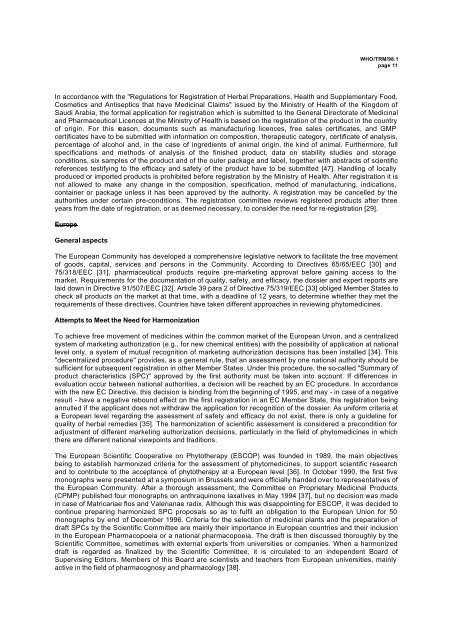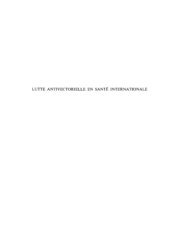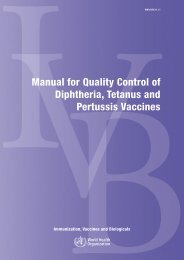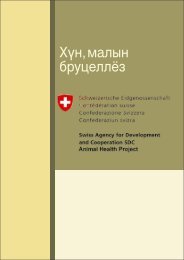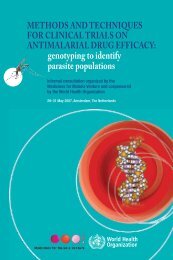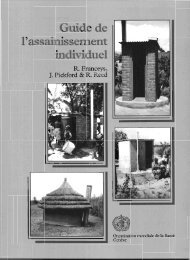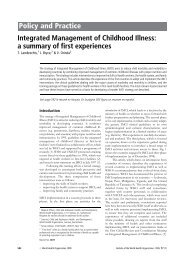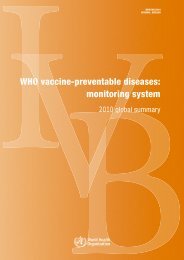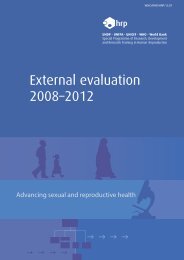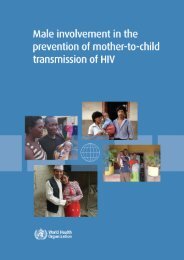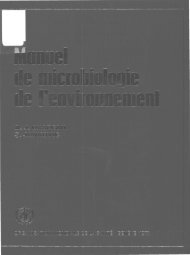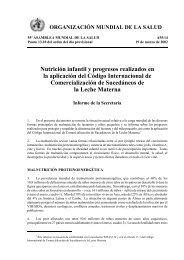Regulatory Situation of Herbal Medicines A worldwide Review
Regulatory Situation of Herbal Medicines A worldwide Review
Regulatory Situation of Herbal Medicines A worldwide Review
Create successful ePaper yourself
Turn your PDF publications into a flip-book with our unique Google optimized e-Paper software.
WHO/TRM/98.1page 11In accordance with the "Regulations for Registration <strong>of</strong> <strong>Herbal</strong> Preparations, Health and Supplementary Food,Cosmetics and Antiseptics that have Medicinal Claims" issued by the Ministry <strong>of</strong> Health <strong>of</strong> the Kingdom <strong>of</strong>Saudi Arabia, the formal application for registration which is submitted to the General Directorate <strong>of</strong> Medicinaland Pharmaceutical Licences at the Ministry <strong>of</strong> Health is based on the registration <strong>of</strong> the product in the country<strong>of</strong> origin. For this reason, documents such as manufacturing licences, free sales certificates, and GMPcertificates have to be submitted with information on composition, therapeutic category, certificate <strong>of</strong> analysis,percentage <strong>of</strong> alcohol and, in the case <strong>of</strong> ingredients <strong>of</strong> animal origin, the kind <strong>of</strong> animal. Furthermore, fullspecifications and methods <strong>of</strong> analysis <strong>of</strong> the finished product, data on stability studies and storageconditions, six samples <strong>of</strong> the product and <strong>of</strong> the outer package and label, together with abstracts <strong>of</strong> scientificreferences testifying to the efficacy and safety <strong>of</strong> the product have to be submitted [47]. Handling <strong>of</strong> locallyproduced or imported products is prohibited before registration by the Ministry <strong>of</strong> Health. After registration it isnot allowed to make any change in the composition, specification, method <strong>of</strong> manufacturing, indications,container or package unless it has been approved by the authority. A registration may be cancelled by theauthorities under certain pre-conditions. The registration committee reviews registered products after threeyears from the date <strong>of</strong> registration, or as deemed necessary, to consider the need for re-registration [29].EuropeGeneral aspectsThe European Community has developed a comprehensive legislative network to facilitate the free movement<strong>of</strong> goods, capital, services and persons in the Community. According to Directives 65/65/EEC [30] and75/318/EEC [31], pharmaceutical products require pre-marketing approval before gaining access to themarket. Requirements for the documentation <strong>of</strong> quality, safety, and efficacy, the dossier and expert reports arelaid down in Directive 91/507/EEC [32]. Article 39 para 2 <strong>of</strong> Directive 75/319/EEC [33] obliged Member States tocheck all products on the market at that time, with a deadline <strong>of</strong> 12 years, to determine whether they met therequirements <strong>of</strong> these directives. Countries have taken different approaches in reviewing phytomedicines.Attempts to Meet the Need for HarmonizationTo achieve free movement <strong>of</strong> medicines within the common market <strong>of</strong> the European Union, and a centralizedsystem <strong>of</strong> marketing authorization (e.g., for new chemical entities) with the possibility <strong>of</strong> application at nationallevel only, a system <strong>of</strong> mutual recognition <strong>of</strong> marketing authorization decisions has been installed [34]. This"decentralized procedure" provides, as a general rule, that an assessment by one national authority should besufficient for subsequent registration in other Member States. Under this procedure, the so-called "Summary <strong>of</strong>product characteristics (SPC)" approved by the first authority must be taken into account. If differences inevaluation occur between national authorities, a decision will be reached by an EC procedure. In accordancewith the new EC Directive, this decision is binding from the beginning <strong>of</strong> 1995, and may - in case <strong>of</strong> a negativeresult - have a negative rebound effect on the first registration in an EC Member State, this registration beingannulled if the applicant does not withdraw the application for recognition <strong>of</strong> the dossier. As uniform criteria ata European level regarding the assessment <strong>of</strong> safety and efficacy do not exist, there is only a guideline forquality <strong>of</strong> herbal remedies [35]. The harmonization <strong>of</strong> scientific assessment is considered a precondition foradjustment <strong>of</strong> different marketing authorization decisions, particularly in the field <strong>of</strong> phytomedicines in whichthere are different national viewpoints and traditions.The European Scientific Cooperative on Phytotherapy (ESCOP) was founded in 1989, the main objectivesbeing to establish harmonized criteria for the assessment <strong>of</strong> phytomedicines, to support scientific researchand to contribute to the acceptance <strong>of</strong> phytotherapy at a European level [36]. In October 1990, the first fivemonographs were presented at a symposium in Brussels and were <strong>of</strong>ficially handed over to representatives <strong>of</strong>the European Community. After a thorough assessment, the Committee on Proprietary Medicinal Products(CPMP) published four monographs on anthraquinone laxatives in May 1994 [37], but no decision was madein case <strong>of</strong> Matricariae flos and Valerianae radix. Although this was disappointing for ESCOP, it was decided tocontinue preparing harmonized SPC proposals so as to fulfil an obligation to the European Union for 50monographs by end <strong>of</strong> December 1996. Criteria for the selection <strong>of</strong> medicinal plants and the preparation <strong>of</strong>draft SPCs by the Scientific Committee are mainly their importance in European countries and their inclusionin the European Pharmacopoeia or a national pharmacopoeia. The draft is then discussed thoroughly by theScientific Committee, sometimes with external experts from universities or companies. When a harmonizeddraft is regarded as finalized by the Scientific Committee, it is circulated to an independent Board <strong>of</strong>Supervising Editors. Members <strong>of</strong> this Board are scientists and teachers from European universities, mainlyactive in the field <strong>of</strong> pharmacognosy and pharmacology [38].


